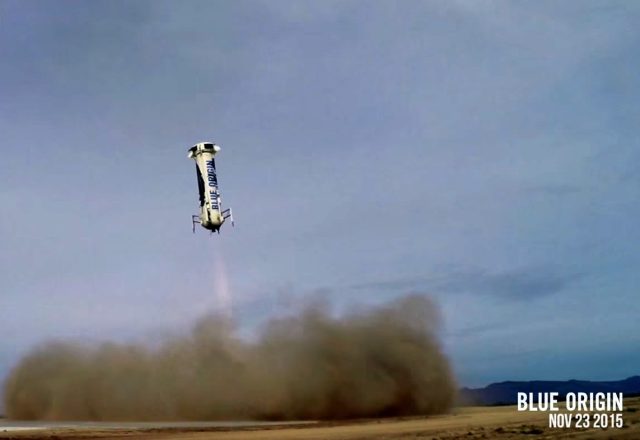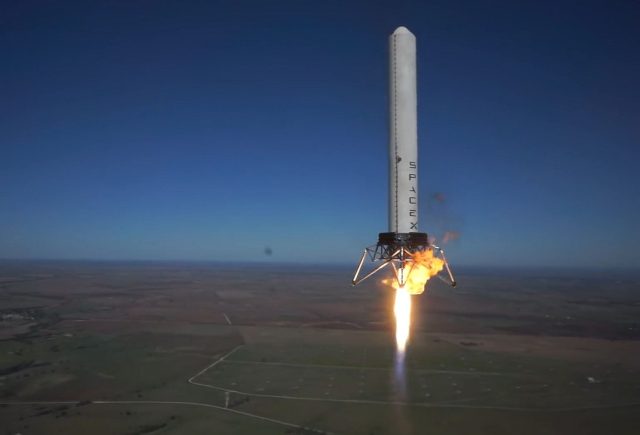
On Monday at 11:21am CT, Blue Origin's New Shepard spacecraft made a successful suborbital test flight and ascended 100.5km into the heavens. But that was only part of the story. After reaching its apogee, the space vehicle began falling back to Earth, reigniting its engine 1.5km above the surface and slowing to a sedate 7 km/h before touching down. The historic spaceflight marked the first time a rocket flew into space and subsequently landed safely on the ground.
Blue Origin announced the milestone on Tuesday. "It was one of the greatest moments in my life," said Jeff Bezos, founder of the rocket company, during a media teleconference. There was not, he added, a dry eye at the secretive landing site near Van Horn.
So moved was Bezos, apparently, that he took to Twitter for the first time:
The rarest of beasts - a used rocket. Controlled landing not easy, but done right, can look easy. Check out video: https://t.co/9OypFoxZk3
— Jeff Bezos (@JeffBezos) November 24, 2015
Shortly after Blue Origin announced the successful test on Tuesday morning, SpaceX founder Elon Musk, who is trying to develop his own rockets that can land back on Earth, tweeted congratulations to the company.
Congrats to Jeff Bezos and the BO team for achieving VTOL on their booster — Elon Musk (@elonmusk) November 24, 2015
In this tweet, VTOL stands for vertical take-off and landing, long a holy grail among Bezos, Musk, and others trying to develop low-cost, reusable rockets that will broaden human access to space. These participants in the "new space" movement have established lowering launch costs as the principal means by which humans will ultimately colonize space.
However, after his congenial tweet, Musk quickly followed.
It is, however, important to clear up the difference between "space" and "orbit", as described well by https://t.co/7PD42m37fZ — Elon Musk (@elonmusk) November 24, 2015
Musk seems a bit miffed to be scooped by Bezos for the first successful landing by a rocket that had flown into space. SpaceX has tried on a couple of occasions to land its Falcon 9 booster on a mobile, seaborne platform. And in this tweet, Musk is saying that by only flying into suborbital space the New Shepard vehicle isn't nearly in the class of his Falcon 9 rocket, which can heft payloads into orbit, and even geostationary orbit, some 35,000km above the Earth's surface.
Musk then proceeded to explain the physics of rocketry on Twitter, making the point that the Falcon 9 rocket booster with its nine Merlin engines was considerably more powerful than the New Shepard vehicle and its single BE-3 engine. (Just one Merlin engine has 934 kilonewtons of thrust, whereas a single BE-3 engine has up to 490 kilonewtons of thrust).
Translation: Mine is bigger than yours.
Bezos was not deterred. During the media teleconference, he gave three reasons as to why his New Shepard flight was so significant. First of all, he said, the first stage of the Falcon 9 booster that SpaceX is trying to recover doesn't make it all the way to orbit. In this way, SpaceX is making a suborbital flight as well. Also, the first stage of the Falcon 9 rocket makes a deceleration burn in space to slow its reentry. This means New Shepard arguably traversed a more harsh reentry environment.
And finally, Bezos said, "The hardest part of landing is probably the final landing segment." Basically, he's telling Musk "mine stood up and yours fell over."
Musk and others have also pointed out that other rockets have made successful flights and subsequent landings. In 1994, the McDonnell Douglas DC-X ascended to an altitude of about 3,100 meters before successfully landing, and SpaceX's own Grasshopper rocket rose to 744 meters in 2013 before landing in Central Texas.
Those were impressive demonstrations, but a few kilometers is far below the 100km Karman line that defines space. Despite the carping on social media, today Blue Origin's achievement is significant, and it marks an important moment in commercial spaceflight.
There are a few more things to consider. Launching and landing rockets remains a very difficult enterprise, and there will be very many failures before there is sustained success. Additionally, how awesome is it that today we have two of the most brilliant Internet tycoons battling to open up access to space for us all? Whoever ultimately wins, we all win.
reader comments
144